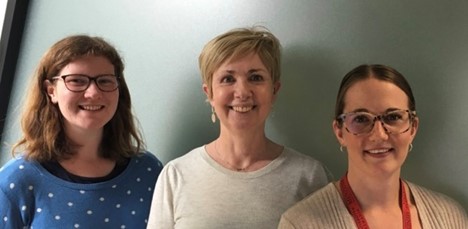Prof Jo Dickinson sat down with the PACT team to talk about her project “Genetic Research in Idiopathic Pulmonary Fibrosis (GRIPF)”, including how it started, what the team hopes it will achieve and the challenges they’ve faced.

Tell us a bit about yourself and why you chose Pulmonary Fibrosis (PF) as your research area:
I am a Professor in Human Genetics at the University of Tasmania with a long held interested in the genetic basis of disease. My background is in inherited cancers and genetics. In recent years there have been dramatic advances in our understanding, treatment and outcomes for cancer through research. There is a strong need to apply these successful approaches to other diseases – particularly those with very poor outcomes such as PF. When I was asked if I would be interested in collaborating on a study in PF, I was instantly keen to be involved – knowing that there is a desperate need to develop effective treatments and improve outcomes. Understanding the genes contributing to inherited conditions has provided an important understanding of disease biology and results in improved management and better tailored therapies. It is very much time this was delivered for PF patients.
Describe your clinical research project in a couple of sentences:
Although there are a number of environmental factors contributing to PF, there is also a strong genetic component to this disease. Whilst there has been some progress in understanding the genes contributing to this PF, a greater effort is needed to understand the high risk genes contributing to this disease. Our study is the first nationwide study in Australia seeking to recruit families with multiple cases of PF. While the genetics of PF is complex, the study of families can reduce this complexity as those developing disease in a family, are likely to do so due to shared genetic factors. We are collecting genetic samples and then perform detailed genetic profiling, comparing affected family members with unaffected individuals to reveal the likely causative genes.
Tell us how this project came about:
My team was approached by A/Prof Tam Corte and a very committed philanthropic donor to ask if we were interested in collaborating. We were instantly keen to work with the team who had already commenced a number of successful PF research projects driving important advances in the care of PF patients.
What do you hope this project will achieve?
Elucidation of the genes contributing to PF will lead to a greater understanding how they drive disease development and the identification of novel targets for treatment. My ultimate dream is that genetic screening can be routinely embedded in PF diagnosis to guide selection of treatment options and allow the development of a range of effective therapeutics.
What has been the biggest challenge of the project so far?
Recruitment in a nationwide study is challenging. We are not conducting an industry backed clinical trial, and we are not offering an experimental therapy. We rely very much on dedicated clinicians and their teams, and the generosity and selflessness of PF sufferers and their families to donate their time and biological samples for our research. In the past 18 months disruption to health services has impacted on our ability to recruit, and of course the ability of our vulnerable participants to attend clinic appointments.
The people working on this project are:
Our team at the University of Tasmania includes Sionne Lucas, Kelsie Raspin and myself. I co-lead this study with Tamera Corte and our steering committee and collaborating clinicians include Dan Chambers, Ian Glaspole, Chris Grainge, Yuben Moodley, Paul Reynolds, Lauren Troy, John Mackintosh, Simon Walsh, and Haydn Walters. Our team has been fabulously supported by Sacha Macansh at Lung Foundation Australia and a team of dedicated research nurses and co-ordinators around the country.
What do you see as the biggest evidence gaps in PF care? What are the clinical research priorities?
Although I am not involved in the care of patients, through our work with clinicians and their patients the priorities are understand their disease- what are the causes, what drives disease progression and what we can do to develop better treatments. Understanding the genetic causes will be one of the important cornerstones that will underpin better treatments for PF.
